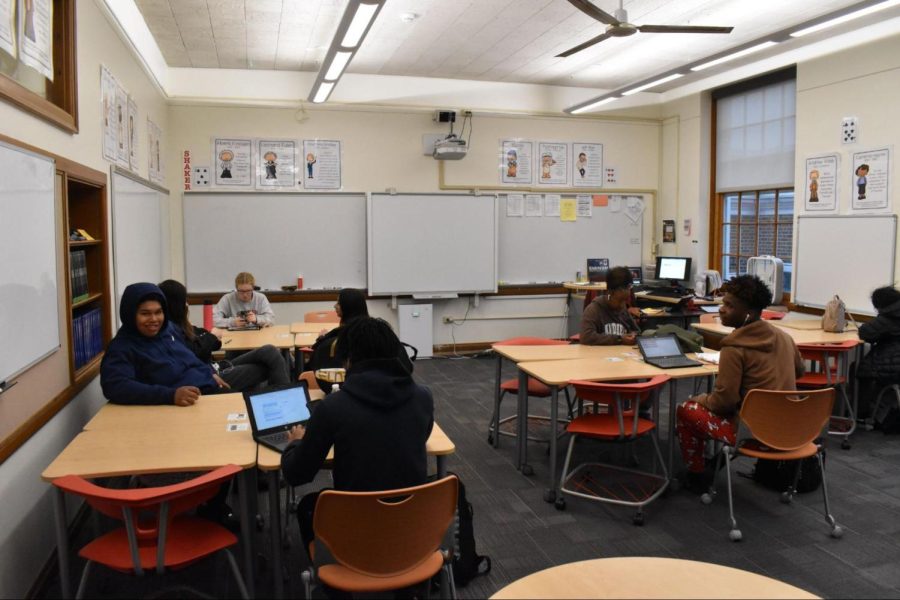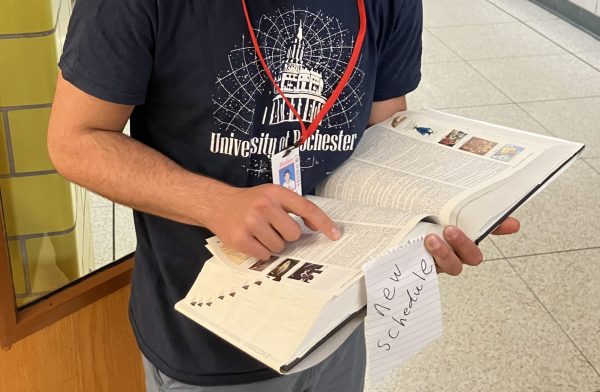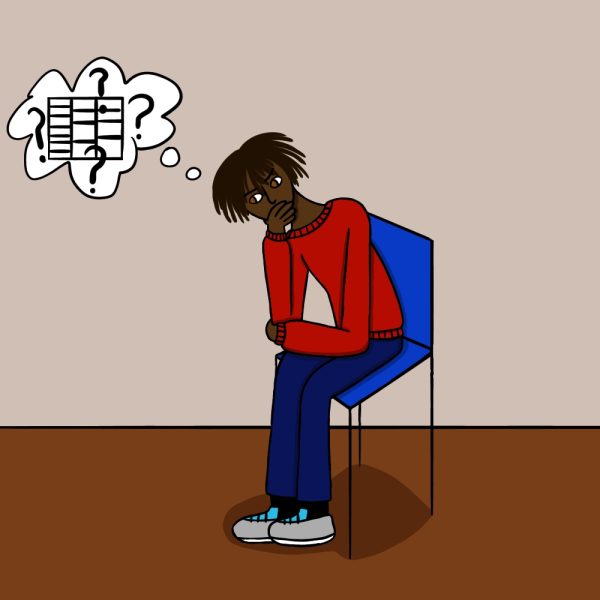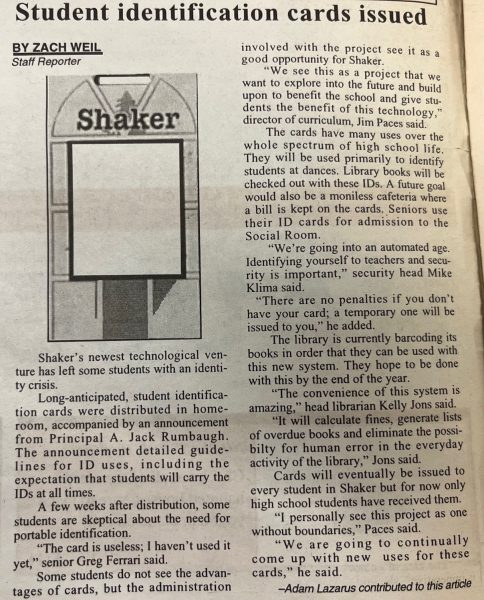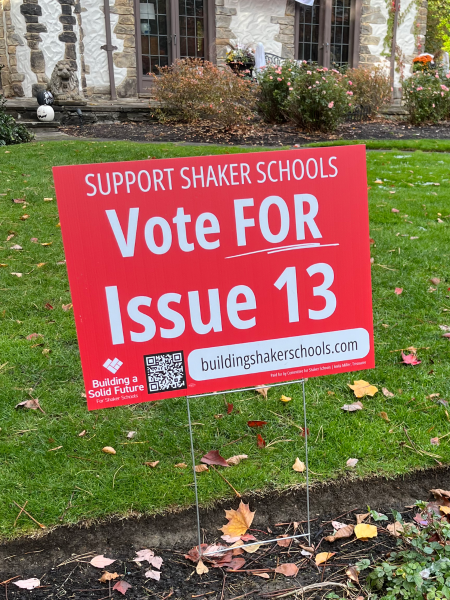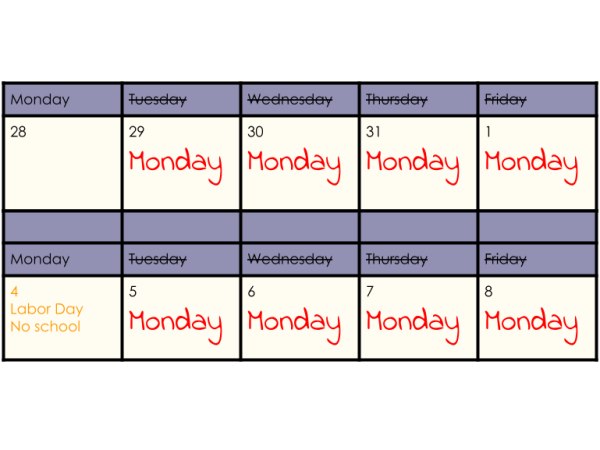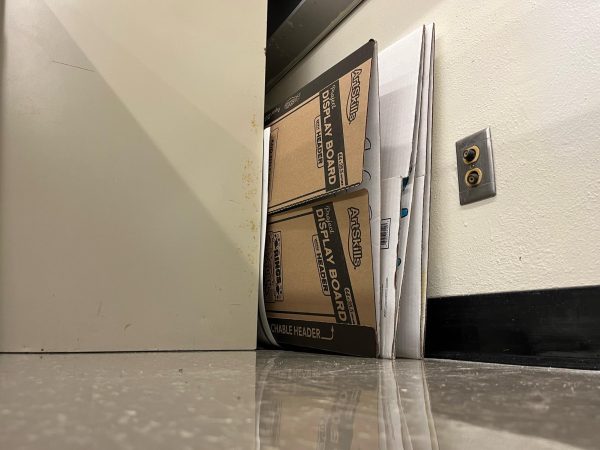‘Rite Idea: Rules Aren’t the Problem
Student backlash regarding the new approach to tardies distracts from underlying issues
A first period math class in Room 234 Nov. 18. In a class of 18 students, only eight were present at 8:20 a.m. when the bell rang.
Editor’s Note: This is the first editorial in a series about policy equity, transportation equity, and student involvement in decision making. All three issues are addressed briefly within this editorial because it is impossible to talk about any one without the others, but we believe they all need to be covered separately as the important, complex issues they are. We ask for your patience while we investigate these issues thoroughly.
We live in a world where a school asks its students to be on time, and outrage ensues.
Shaker Heights High School enacted a new set of tardy expectations effective Oct. 31, and the backlash that followed from students was intense.
The new guidelines were developed by the high school’s Systems and Structures Driver Team, according to principal Eric Juli, and were not approved by the Board of Education. Because of this, they do not constitute a policy, but expectations and guidelines.
The most frequent criticism concerned how the expectations, as presented during Crew Oct. 28, would affect students for whom getting to school in the morning is a greater challenge than for others.
While this issue needs to be addressed, the complaints about the new expectations are misdirected. There is nothing wrong with the expectation that students arrive to every class on time.
Inequity exists, without question, but it has long preceded the most recent effort to curb tardy arrivals. The district does not bus high school students. This practice inequitably affects those who cannot find transportation because they do not have a car, or have parents who cannot drop them off. Many of these students are Black. The tardy expectations themselves are not the problem. To complain about them while ignoring the bigger issue is doing a disservice to those for whom we, as students, are trying to advocate.
Equity was a factor in the guidelines’ creation, which is the reason that “student support teams” exist. This doesn’t mean there isn’t room for improvement, however.
Outrage regarding the new rules comes from a continued lack of clear communication from administration. The expectations were explained during some Crew meetings, but students and parents did not receive notice or a copy of the document until Juli included the written version in his Oct. 30 Weekly Roundup newsletter. There, the guidelines were not actually explained until the third page; most students likely didn’t read them before drawing conclusions concerning their content.
There are kids who are having trouble getting to school because they live far away, But we can’t see those trees through this forest because we have 2,000 late arrivals to school — Principal Eric Juli
Tardy policies exist in nearly every school in the country, and for good reason; students can’t learn if they’re not in school. Students accumulated more than 2,000 tardies the first week the new expectations were enforced, including more than 1,000 late arrivals to school, according to Juli. “Pre-pandemic, we didn’t have any tardy numbers to school like this. It has never been like this before,“ he said.
Allowing this pattern to continue would inadequately prepare us for life after graduation. In addition to missing class time, arriving late disrupts other students’ education by forcing the teacher to stop teaching to bring the late student up to speed.
“There are kids who are having trouble getting to school because they live far away,” Juli said. “But we can’t see those trees through this forest because we have 2,000 late arrivals to school. We’re trying to get to a place where the kids who can get here on time, no problem, are getting here on time, no problem, and then we’re left with a group of kids who may have challenges.”
When compared to neighboring schools, the new rules are incredibly lenient.
Each of the first nine tardies a student accumulates will result in a phone call and email to their parents. After 10 tardies, the student will be required to attend an after-school detention, called “extended day,” and if the tardies are primarily at the beginning of the day, “a student support team meeting is scheduled,” according to the document. After 15 tardies, the student may be assigned to “Saturday school,” and additional student support team meetings would be scheduled.
Nearby district policies are much more strict. Cleveland Heights, for example, begins assigning after-school detentions after three tardies, Saturday school after four, in-school suspension after five, and a possible out-of-school suspension after the sixth tardy. Similarly, Beachwood assigns morning detentions after three and six tardies, with an in-school suspension assigned after nine.
The student support team meetings, if used properly, are a promising solution to ensuring that the rules are applied equitably. “The student support team would consist of the student’s guidance counselor, the first or second period teacher – or both if the person is late every day – the grade-level assistant principal, the student themselves, and the parent or guardian,” Juli said. “It’s bringing together the group of people to, in a short-term way, try to figure out how to solve the problem.“
According to Juli, the student support teams will develop a two-week plan to help the student get to school on time. They will then reevaluate the plan every two weeks until the problem is resolved.
We believe support team meetings should occur earlier, however. Rather than waiting for 10 late arrivals, they should take place after a student accumulates four or six.
The consequences outlined in the guidelines are only meant to “act as a deterrent for most of the students who can get to school and class on time and simply don’t,” Juli stated in the Oct. 30 Weekly Roundup.
“Everybody here is dealt with on a case-by-case basis,” said Juli. “If there is a student who, for whatever reason, absolutely cannot get here, we’re not going to punish them for that. We’re going to figure out how to help them.”
We are glad to live in a community that encourages students, parents and staff to ask questions, make suggestions and provide feedback. However, there is a point at which criticism goes too far. Yelling at faculty – many of whom had very little to do with drafting the expectations– and drawing conclusions before we have had a chance to read the rules, is unacceptable, and we can do better.
Advocating for change is important. Using our voices as students is important. But we need to ensure that we are well informed before doing so if we want our feedback to result in change.
That doesn’t mean that the administration is free from our criticism, however. They need to work on how they communicate rule changes to students.
These rules affect us most, so our voices should be involved in creating them. There should be an opportunity for students to provide feedback before they’re final, and that feedback should actually be addressed by the decision makers.
Administration should be transparent when they announce policy changes. There should be clear communication about the changes, including a complete copy of the changes, emailed to every student at the same time it’s announced. Such changes should be finalized before the start of the school year and included in the student handbook. Coming up with new rules halfway through the year and expecting Crew teachers to explain them is frustrating and only leads to misunderstanding.
The documents containing these rules should also be brief, and worded so that students can understand them. The current document is broken up into “Teacher Action Item” and “Administrator/Dean Action Item,” which makes it seem like it was written to serve teachers and administrators, not students.
Rules should be reevaluated regularly, but we need to wait for results before we can decide what needs to change. The Shakerite will investigate how the rules are enforced, and we will publish a followup once we have enough information to draw a conclusion.
As with every change, we know everyone has their opinions, and they may disagree with ours. We encourage readers to share their opinions with us via a letter to the editor, which may be published if it contributes uniquely to the conversation.
So, if you can get to school and class on time, do it. If you have an idea about how to help others do so, share it. And, if you want the district to solve transportation inequity, the next school board meeting is Dec. 13 at 6 p.m. in the small auditorium.

